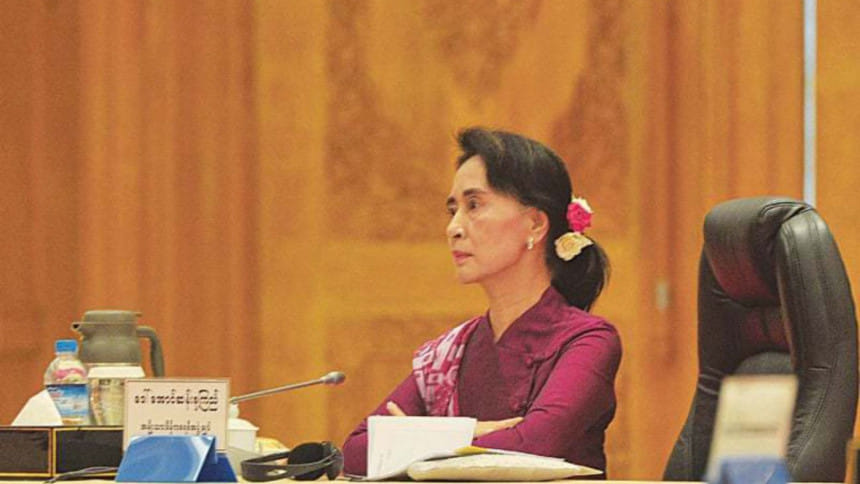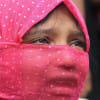Dealing with a chameleon

The traditions of Myanmar's hermitage, of which the Burmese military remains a purveyor, sometimes come to the fore in awkward ways.
One story exemplifies this. Shwe Eain Si (19), the Miss Grand Myanmar, lost her title because of commenting on the Rohingya issue in Rakhine State and posting it on Facebook. What she said, however, resonated with a prevailing view on the subject: "The Arakan Rohingya Salvation Army (ARSA) is responsible for the violence in the State." As if that was not flattering enough to the regime, she went on to add, "ARSA by recourse to a deception was trying to draw the sympathy of the international community." It went viral, clearly not to the liking of the organisers who balked at her reference to "violence in the state" presumably ruffling the feathers of the military.
The nervous organisers preferred to err on the side of caution saying, "Since Shwe Eain didn't behave like a role model, she has to forgo the title, trophy and the award money."
Even Suu Kyi as the de facto leader of the government, knowing how her country is riven by inherent ethnic divisiveness, shared with a Minister of State at the Foreign Office, Mark Field, the positive stories outside Rakhine State where "Flowers of democracy have begun to bloom in Burma". If that indeed is the case, why must Rakhine be a cauldron of hell for a single ethnic minority?
The Myanmar government insists on verification of more than half a million Rohingyas, mostly Muslim refugees, to be entitled to repatriation to their ancestral home on the other side of the border. Yet, what illustrates the basic irony is that despite repeated requests by the international community, it was denied access for well over a month to the troubled state to verify allegations of mass murder and arson against the authorities. The incidence and traces of barbaric cruelty were corroborated by satellite images.
Nonetheless, the shutting out of the true picture on the ground and blocking aid to the victims have been the biggest obstacles in preventing a humanitarian disaster from snowballing as it has.
Finally, last Monday, coinciding with the ministerial level meeting between both sides in Dhaka, 20 diplomats from the west with one from Indonesia were given a conducted tour of the ravaged villages. They were appalled at the sight of the burned, scrawny habitats.
Hawks in the military like to air the view that in accordance with an old Burmese law/custom, burned lands belong to the state. One wonders what the refugees might return to!
The sequel to the meeting between the Myanmar Union Minister U Kyaw Tint Swe and the Bangladesh Foreign Minister AH Mahmood Ali in Dhaka last Monday and the press statement of Myanmar's State Counsellor's Office has been marked by cautious optimism in Dhaka. Both sides have agreed to have the Rohingya refugees return to Myanmar and to this end, form a joint working group to start the process of repatriation. Yet, the two countries differ on the question of involving the UNHCR in the process entailing verification, voluntary return, resettlement of the refugees in Rakhine with full dignity, restored livelihoods and security.
Bangladesh wants to associate the appropriate UN agency with the multi-faceted task but the Myanmar government is against any UN involvement. The State Counsellor's Office alluded to the MoU of April 28, 1992 which was fully bilateral without any involvement of UN bodies. This deviates from Aung San Suu Kyi's September 19 speech which had clearly mentioned that the refugees would return in line with the 1993 Rohingya Repatriation Agreement between Myanmar, Bangladesh and the UNHCR.
Given Myanmar's track record on repatriation and the undoing of it, we can be bilateral as far as the formation of a joint task force goes but not anything beyond that. In terms of the verification of refugees made complicated by lack of papers and their sequential return to their ancestral homes, UN involvement is not just desirable but also essential. This should form part of the TOR (terms of reference) of the basic agreement itself. Even Kofi Annan's thrust on restoration of citizenship right to the Rohingyas should evoke a positive response to guarantee a sustainable solution to the retrograde problem of religious ethnicity.
It cannot be lost on Myanmar that it was only when international pressure had stacked heavily against it that she took the initiative to engage Bangladesh. There is no going back on her part now. Those collective concerns and pressures on Myanmar to abide by the rule of law do not only remain but are likely to be bolstered by each incident of Myanmar's betrayal.
The voices that remained to be galvanised are repositioning themselves behind the cause. India at the UN Human Rights Council had wanted the repatriation of the Rohingya refugees and urged Myanmar to give citizenship in the Rakhine state for a sustainable solution to the crisis. Can China and Russia have a quarrel with that kind of a rational approach?
The terrorist card cannot be overplayed in Myanmar at the expense of tackling spill-overs into the wider region. That realisation is dawning.
Shah Husain Imam is a commentator on current affairs and former Associate Editor, The Daily Star.
Email: [email protected]










Comments